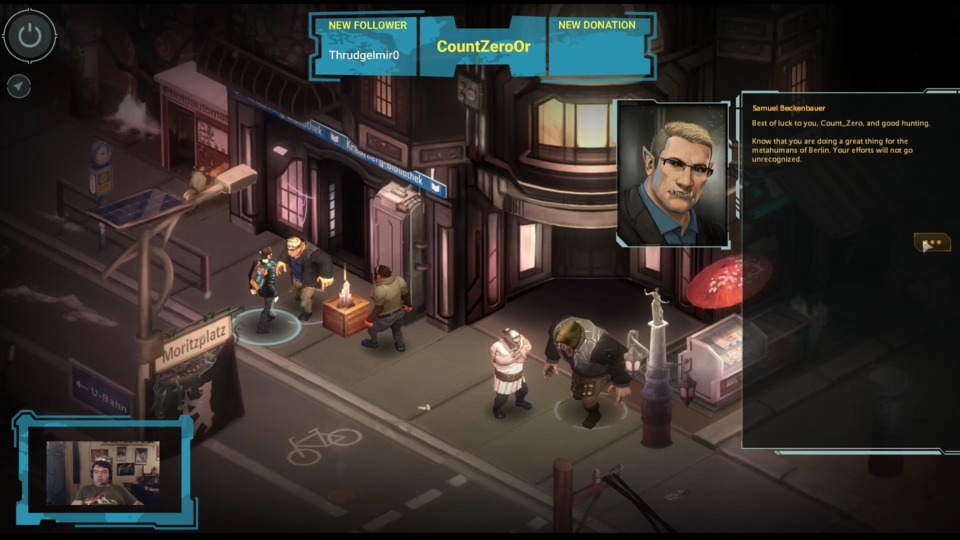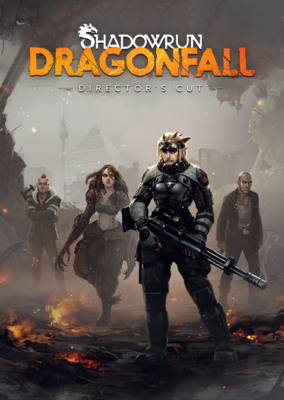An improvement from "Dead Man's Switch" - but not without some mechanical issues
When I beat Shadowrun Returns: Dead Man’s Switch, I enjoyed the game but found it lacking in a lot of respects. While Dead Man’s Switch was an RPG that captured a bunch of the feel of the world of Shadowrun and invoked one of the classic adventures from the game, it was missing some of the dynamism of the RPG that other PC RPGs brought to the table. Shadowrun Dragonfall addresses these concerns and creates an RPG that is a more marked improvement over its predecessors.
Change in Scenery
Shadowrun: Dragonfall moves the action from Seattle, where the home of the first game and the series initial setting, to Berlin, a less known area of the setting. Berlin, rather than being part of a larger German government, has become an entity called the Flux-state, or “F-state”. The F-State is basically a loose anarchist collective of loose anarchist collectives, with no actual real organizing force. The German sourcebook for the Shadowrun tabletop game delved into this in brief, and presumably, the German-language game material delved into Berlin more in-depth. However, in the US, we didn’t get much material on the city, beyond the “loose collective of collectives” concepts, and the fact that the F-State is so hostile to any sort of organized system of governance within the F-State, that a collective that tries to do anything like “elections” or having a “leader” somewhat organically gets smacked down hard by the various other collectives. It also means that living in the F-State can really suck depending on what neighborhood you’re in.
Shadowrun: Dragonfall, through its worldbuilding, captures this really well. Over the course of the game, your team will end up traveling through about a handful of different neighborhoods, or keitz, each generally having a different flavor.

Change in Campaign
The tone of the runs you take on over the course of the game is also different. Instead of the majority of your runs being for corps, most of your runs are for your own keitz, the Kreuzbasar. It puts a lot more focus on a type of campaign known as “Hooding” (short for “Robin Hooding”). It’s a real tonal shift from ‘runner as a hustling criminal.'
Shadowrun: Dragonfall also escalates the stakes better from the first game. Dead Man’s Switch was a conventional mystery story that did not lead smoothly into the Universal Brotherhood plot. The links were there, but they didn’t carry the plot over well.
By contrast, Shadowrun: Dragonfall sets up its premise at the get-go and sticks with it. The game starts off with a run gone bad, and the rest of the plot builds off of that. Your character ends up becoming the team’s leader after the original leader, Monika, is killed. This gives a narrative basis for exploring your teammates’ backstories through loyalty missions.
Similarly, the thrust of the plot of the game is finding out why that run went bad. When the plot shifts into, effectively, save the world territory in the last act, it fits. The level of resistance that you ran into on the initial run makes sense given the threat.
Still bugs in the system
That said, there are still some structural flaws here, which are issues at the engine level. While you have a recurring party and can customize their character growth, you can’t really use them. You can’t apply their skills to checks. Worse, you can’t transfer useable items like medkits among characters.
As an example, a terminal on one of the runs has info that will help you. To get that info, you need a Biotech skill of 5 or better. One of your main teammates, Glory, has a biotech skill at that level. In a tabletop game, and in even other CRPGs like Mass Effect, you could apply her skill to this. At the table, this would be through the player making the check. Mass Effect just automatically applies that character’s skill. In Shadowrun Dragonfall, only your skill rankings matter. You can get around this using console commands to rank up your skills to match your teammates on necessary checks. Still, that’s not ideal.
However, inventory management is where things really fall down. Each character has a selection of about 10 usable items they can carry. These include healing items, foci for summoning spirits, and grenades. When spots clear up in inventory, I can’t transfer items between characters. Worse, when I find pickups of consumables, I can’t choose to give them to there characters. If my slots are full, Eiger has two open slots, and I find grenades, I can’t give them to her. At the table, this isn’t a problem. In other CRPGs, this isn’t a problem. This is specific to this engine. Hopefully, Shadowrun Hong Kong will finally fix this.
Final Thoughts
I really liked the story of Shadowrun: Dragonfall a lot more than the first game. Mechanically, there are some real issues with how the engine implements skills and inventory that can make things frustrating. Consequently, I did find myself using console commands and dropping the difficulty to work around these shortcomings.
(This review originally appeared on my blog)
